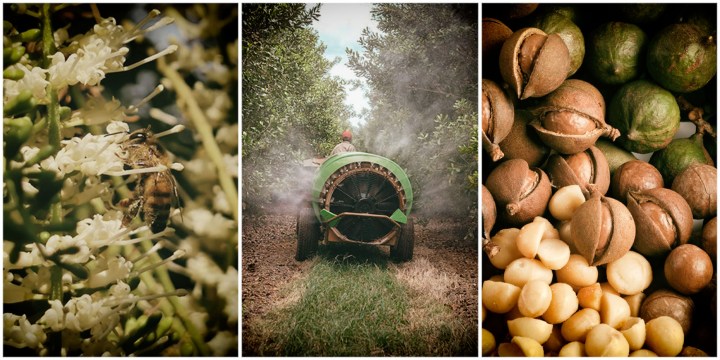POLLINATORS UNDER PRESSURE
Bees threatened by booming macadamia nut industry

Rapid growth in macadamia nut cultivation in South Africa has been good for farmers, but not for beekeepers, who are losing bee colonies to intense insecticide use.
Bees are among the major pollinators of a large number of the plants we eat and, as the demand for food grows, these key insects are under pressure. Farmers are growing crops at a rate that requires more pesticides, which have negative effects on insects, particularly bee colony populations.
Macadamia cultivation in South Africa has grown so rapidly that the country is now Australia’s main competitor for the title of the world’s number one nut producer – with more than 700 growers in the country. The boom in demand for macadamias, boosted by global health trends, has made South Africa the largest commercial planter in the world.
While pesticides to protect the value of the nuts have benefitted farmers and the economy, they have damaged the crop pollinators.
Inge Austin, Mpumalanga Beekeeping Interest Group coordinator, told Daily Maverick “macadamia bee value” was high, with a recent study showing an increase of up to 62% in nut set and quality where nut trees are pollinated by honey bees.
“Yes, bees are required for adequate pollination. The problem is when they apply pesticides when the bees are there, during flowering season,” Austin explained.
Schalk Schoeman, research and extension manager at Macadamia South Africa (SAMAC), told Daily Maverick that while solitary bees were found in large numbers as pollinators, about 90% of macadamia pollination was done by honey bees.
Austin explained that both pesticides and fungicides negatively affected bees when applied in flowering season. Unseasonal rains, which have come a month earlier than usual in the Lowveld region in the past two years, have caused fungal infections in flowers and this has prompted farmers to use fungicides while the bees are still pollinating.
Dr Adriaan du Toit, chairman of the board of directors at the South African Bee Industry Organisation (SABIO), told Daily Maverick pests have always been a problem in agriculture but training and awareness initiatives aim to ensure the use of the right chemicals at the right time.
“We are working very closely with the macadamia association (Macadamias South Africa); we are trying to persuade farmers to spray chemicals at night when the bees are not active,” said Du Toit. “We have had huge successes with that and many farmers are changing their practices at their own cost. We are making them realise we need to have healthy bees.”
But it’s not just the time of spraying that affects bees, the type of pesticide is also an issue.
The pesticide neonicotinoid has been banned in Europe for its neurotoxic effect but is still available and widely used in South Africa. The pesticide, which travels through a plant from its root, becomes a neurotoxin to bees within 10 days of use.
Schoeman said neonicotinoid was still legal in South Africa but he suspected this may change in the future. Alternatives were being developed, but farmers with rough terrain, difficult for tractors to reach for alternative pesticide use, are left with few options.
“There are a bunch of new pesticides available in South Africa but the regulating authorities make it difficult for these products to go through the registration process. It really can take a couple of years for a chemical product to be registered,” said Schoeman.
“The other thing is, even if you release natural products, it also has to be registered. Act 36 (Fertilisers, Farm Feeds, Seeds and Remedies Act 36 of 1947) mandates that anything used in agriculture has to go through a rigorous process of scrutiny.
“I do not see a problem with that, the only problem I see is the time it can take. It can take five to seven years and I wish it was a bit shorter. In agriculture, when things change, you have to be there and go with the change. You can’t react too slowly as that’s going to pull the competitive rug from under us,” Schoeman said.
Austin said beekeepers understood that farmers had to use pesticides on crops but it had to be done in an environmentally friendly way that did not kill bees and other pollinators.
She added; “Macadamias are not the only crops that are detrimental to the health of honey bees; there are several of them. But, because there is such a huge growth of the macadamia industry in the country, it is something we are really concerned about because they need bees so desperately yet our colonies often dwindle after they have been on the macadamias. They don’t always die outright then, but in the months that follow you have a slow collapse; it’s like they never really recover.”
Du Toit said: “From both industries (beekeeping and macadamias), we try to educate farmers on the choice of pesticide because there are alternatives. But that will take time and is a continuous effort.”
About a third of crops depend on pollinator insects in their flowers. Without them, crop production would decline by about 5% in high-income countries and 8% in low- to middle-income ones, Our World in Data has found.
Crops that heavily rely on bees for pollination include fruits such as apples, apricots, blueberries, cherries, mangoes, peaches, plums, pears and raspberries. Nuts such as almonds, cashews and kolas, along with avocados, are also highly dependent on pollinators. Kiwi fruit, melons, pumpkins, watermelons, as well as cocoa beans and brazil nuts, would lose about 90% of their yields without pollinators.
While spraying Doom on insects has become instinctual, the 40% decline in insects could spell disaster for humanity as the Earth’s ecology relies on insects to maintain processes that keep everything alive. The “windshield phenomenon” has proven that the decline in the number of insects on your windshield is an indicator of the decline in insect populations globally, has shown the decline of insects due to a number of factors.
“A rethinking of current agricultural practices, in particular a serious reduction in pesticide usage and its substitution with more sustainable, ecologically based practices, is urgently needed to slow or reverse current trends, allow the recovery of declining insect populations and safeguard the vital ecosystem services they provide. In addition, effective remediation technologies should be applied to clean polluted waters in both agricultural and urban environments,” says a study conducted by scholars from Australia, Vietnam and China.
With macadamia pollen being sticky and not being able to be pollinated by wind, the crop requires dispersal agents such as bees.
Said Austin: “We as beekeepers are not saying to farmers, ‘Don’t spray’. We are saying, ‘Spray at the right time with the right stuff’. I would normally encourage them to check labels before spraying, avoid mixing chemicals unless indicated, spray at night when bees and other pollinators aren’t active, scout to spray areas where you need to and not to blanket spray. When farmers blanket spray it’s costly to the environment, because you are killing everything. You walk in some orchards and you don’t see the beneficial predators; the only things alive are the pests they are trying to kill!” DM/OBP





















 Become an Insider
Become an Insider
Comments - Please login in order to comment.